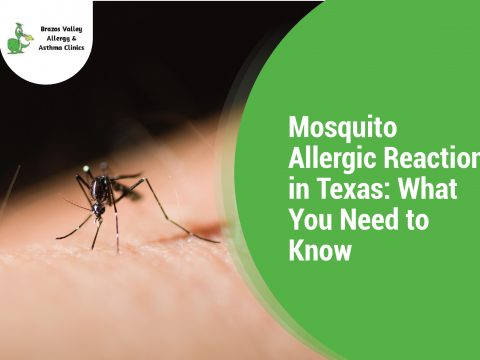- 979-485-9287
- office@bvallergy.com
-
 979-251-7804
979-251-7804
Is It a Cold or Allergies?

Your Guide to Selecting the Best Texas Allergy Specialist
October 19, 2023
How Do I Manage Cedar Allergies in Texas
December 7, 2023How to Tell the Difference Between a Cold and Allergies
The sniffles, the sneezes, and the general feeling of malaise may be familiar to many of us, but we don’t always know what’s happening behind these common symptoms. Is it the colds, or are those pesky allergies playing tricks on you again? As the seasons change, so do the culprits behind these symptoms.
It is often challenging to distinguish between allergies and colds as many of their signs overlap. This situation underscores the importance of knowing their critical differences, helping you understand which condition you’re dealing with and seek the appropriate treatment when needed.
Here’s everything you need to easily tell colds and allergies apart.
What Is the Common Cold?
The common cold is a viral disease of the upper respiratory tract. It affects the nose, throat, sinuses, and larynx. It is a widespread illness that affects people of all ages.
Symptoms
The common cold symptoms are usually:
- Sneezing
- Runny or stuffy nose
- Sore throat
- Cough
- Mild body aches
Although the common cold is usually mild, it may lead to more severe complications, especially in people with less optimal immune systems, such as young children or older adults.
What Is an Allergy?
An allergy is an immune system overreaction to a substance that is usually harmless to most people. The immune system mistakes the substance, known as an allergen, as a threat and produces antibodies to fight it.
Symptoms
The symptoms vary from mild to severe, including:
- Itchy or watery eyes
- Sneezing
- Runny nose
- Coughing
- Skin rashes or hives
- Stomach cramps
- Difficulty breathing
Common allergens include:
You can manage allergies through several measures, including avoiding the allergen, taking anti-allergy medicines, and trying immunotherapy (allergy shots).
Allergies vs. Colds
Although the symptoms of a cold and allergies may seem similar, the causes of these conditions are entirely different. While viruses cause colds, allergies occur when your body’s defenses overreact to a trigger, such as pollen, dust, mold, or pet dander.
The Onset Drama
Colds like to make an entrance – sudden and impactful. You’ll wake up one day feeling perfectly fine, only to find yourself struggling with sniffles, mild body aches, and fatigue by evening. On the other hand, allergies are more subtle, creeping up gradually as pollen counts rise.
The Sneaky Culprits
How do you tell if it’s a cold or allergies? Allergies have their sneaky accomplices – pollen, dust mites, pet dander, the list goes on. If your symptoms coincide with the blooming of flowers or the shedding of trees, it’s probably the allergies pulling the strings. Conversely, the cold is caused by viruses, making its rounds during the colder months. Knowing the accomplices is your first step in identifying the true mastermind.
The Telltale Signs
Allergies feel like a cold, so it blurs the line between the two conditions, but here’s how they differ: A runny nose is like the common cold’s calling card. Also, colds typically come with body aches, stuffy nose, and sneezing. On the other hand, allergies may cause a runny nose, but only occasionally. Moreover, allergy symptoms usually affect only the nasal passages.
The Eyes Have It
Colds and allergies may have adverse effects on your eyes. Itchy, watery eyes are classic allergy symptoms resulting from your immune system mistaking harmless substances for invaders. Pay attention to these ocular signals – they might be the key to unlocking the mystery.
Time Tells
While the colds and allergies leave you feeling under the weather, their timelines differ significantly. The common cold is typically a short-lived but intense affair, with symptoms peaking within a few days and subsiding within a week or two. Allergies are persistent troublemakers, sticking around for weeks or even months as long as the trigger persists. Track the duration, and you might catch the culprit red-handed.
Unravel the Mystery and Reclaim Your Well-Being!
In the battle against colds and allergies, awareness is your greatest weapon. By paying attention to the nuances of its onset, symptoms, and duration, you’ll identify the true cause and tailor your approach to recovery.
Whether it’s a viral invader or a seasonal saboteur, knowing the enemy is half the battle. So, remember these clues next time these unseen assailants pay you a visit, and inform your physician as needed.
Common Cold FAQs
Q: How is cold spread?
The common cold often spreads through droplets released when an infected person coughs or sneezes.
Q: How can I prevent getting the cold?
The best way to avoid the cold is to observe a healthy lifestyle. Other preventative measures include:
- Washing your hands frequently
- Avoiding close contact with sick people
- Staying home if you are sick
- Taking vitamin C
Q: How is the cold treated?
Antiviral medications are suitable to treat the cold. These medications work best if taken within the first 48 hours of the onset of symptoms.
Q: How long does the cold last?
The common cold typically lasts for about 7 to 10 days. However, some symptoms, such as coughing and fatigue, may persist for several weeks. Getting plenty of rest, staying hydrated, and treating your symptoms help alleviate discomfort and speed up recovery.
Q: When should I seek medical attention for the cold?
Consult your healthcare provider if your symptoms persist or worsen after a week or if you have any underlying health conditions that could complicate your illness. If you experience high fever, breathing difficulties, chest pain, or severe headache, seek immediate medical attention.
Allergy FAQs
Q: What are the most common allergens?
The most common allergens are shellfish, mold spores, pollen, dust mites, animal dander, certain foods such as nuts and dairy, and medications such as penicillin.
Q: What is anaphylaxis?
Anaphylaxis is an alarming and potentially life-threatening allergic reaction. It can result in symptoms such as difficulty breathing, drop in blood pressure, rapid pulse, skin rash or hives, nausea, vomiting, and loss of consciousness. Anaphylaxis usually occurs within seconds or minutes of exposure to an allergen and requires immediate medical attention. Epinephrine injection is the first-line treatment for anaphylaxis.
Q: How are allergies diagnosed?
Doctors diagnose allergies through skin tests, blood tests, and elimination diets. In skin tests, allergy doctors expose your skin to small amounts of allergens, performing a skin prick or scratch to see if a reaction occurs. Blood tests measure the antibodies produced in response to specific allergens. Elimination diets involve excluding certain foods to see if symptoms improve.
Q: How can I prevent allergies?
The most efficient way to prevent allergies is to avoid exposure to allergens. This method may involve staying indoors during high pollen counts, using air filters, washing bedding and clothing frequently, and avoiding foods that trigger allergic reactions.
Q: How are allergies treated?
Allergies are treatable with antihistamines, decongestants, and nasal corticosteroids. Immunotherapy, also known as allergy shots, desensitizes the immune system to specific allergens over time. In severe cases, emergency medications such as epinephrine may be necessary.
Experience Freedom From Colds and Allergies With Us!
If you searched online for “Is cough allergies or cold,” “How to tell if I have allergies or a cold,” “Symptoms of a cold vs allergies,” “Allergist Austin,” “Allergy doctor near me,” and “Columbus clinics” and arrived here, you’re on the right page!
We understand the challenges in identifying colds and allergies. Our board-certified allergy experts have the experience to treat and manage both medical conditions accordingly. We aim to provide a stress-free experience for all our patients, from the initial consultation to the follow-up checkups.
Book an appointment here!




